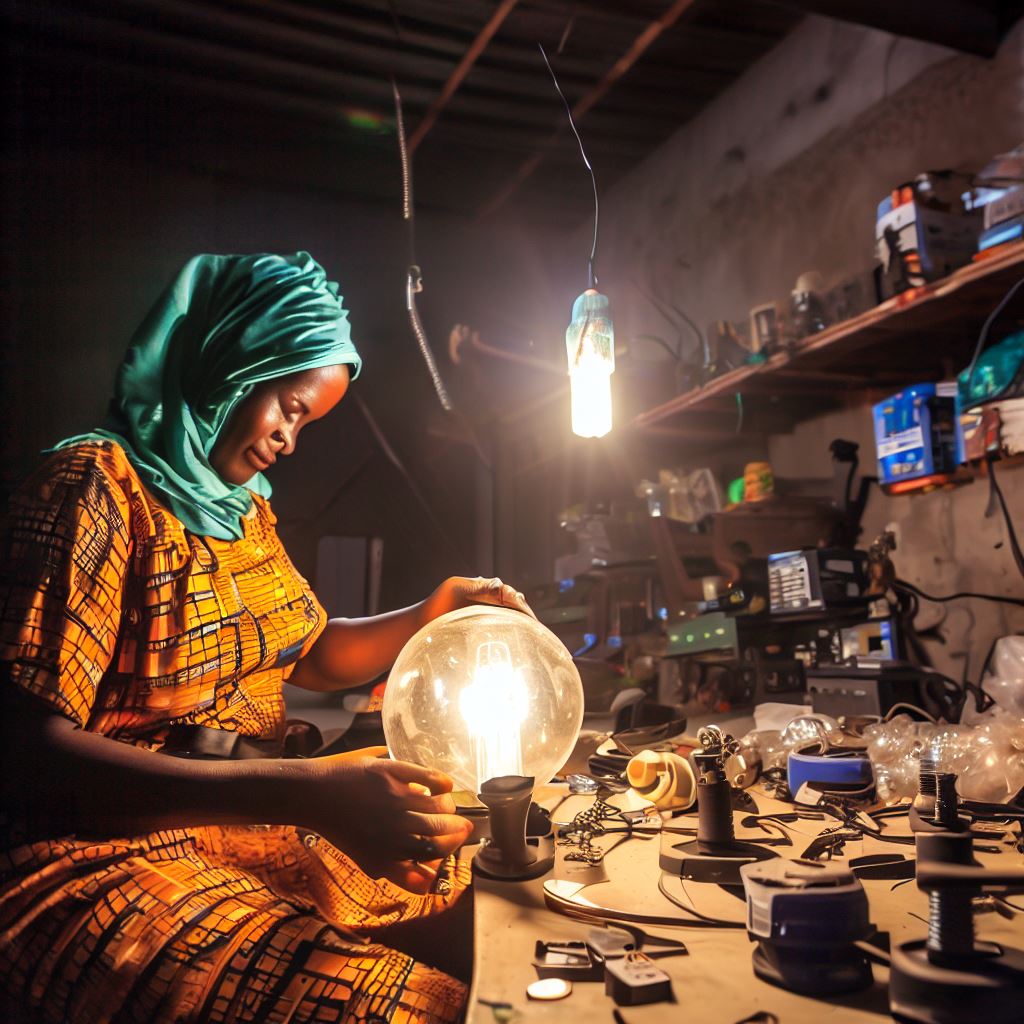Introduction
Let’s explore certifications and training for lighting technicians in Nigeria.
Lighting technicians are professionals who manage lighting equipment and design for various events and productions.
In the dynamic and ever-evolving field of lighting technology, Nigeria stands as a beacon of growth and innovation.
As the demand for advanced lighting solutions continues to surge across various sectors, the role of Lighting Technicians has become pivotal in shaping the landscape of illumination in the country.
To meet this burgeoning demand, a robust framework of certifications and training programs has emerged, providing aspiring technicians with the knowledge, skills, and expertise necessary to excel in this specialized field.
Certifications and training are crucial for lighting technicians in Nigeria to enhance their skills, knowledge, and credibility in the industry.
This comprehensive guide delves into the diverse array of certifications and training opportunities available to Lighting Technicians in Nigeria.
From fundamental courses that lay the groundwork to advanced, specialized training that hones specific skills, this resource aims to illuminate the path towards a successful career in lighting technology.
Embarking on this journey, technicians not only gain proficiency in the practical application of lighting systems but also delve into the intricacies of design, installation, and maintenance.
This guide will navigate through the key certification bodies, renowned training institutions, and recognized programs, offering insights into the curriculum, duration, and prerequisites of each.
By the end, aspiring Lighting Technicians will have a clear roadmap to follow, tailored to their interests and career aspirations.
Join us as we shed light on the pivotal role that certifications and training play in empowering Lighting Technicians in Nigeria, equipping them to illuminate the future of lighting technology in the nation.
In Nigeria, certifications and training for lighting technicians play a crucial role in professional growth and overall benefits.
Overview of Lighting Technician Certification
A. Importance of certification for professional growth
- Obtaining certifications ensures credibility and enhances career prospects.
- Certification validates skills, knowledge, and expertise in the field of lighting.
- Professional growth is accelerated due to industry recognition of certified lighting technicians.
- Employers prioritize certified professionals, leading to better job opportunities and higher salaries.
- Certification allows for continuous learning and staying updated with evolving lighting technologies.
B. Benefits of having certified lighting technicians
- Enhanced professionalism and increased confidence in performing lighting-related tasks.
- Improved problem-solving skills, enabling technicians to handle complex lighting setups.
- Increased job security and stability as certified technicians are seen as valuable assets.
- Higher job satisfaction and career fulfillment due to recognition and respect within the industry.
- Networking opportunities with other certified professionals, fostering knowledge exchange and collaboration.
- Access to exclusive job opportunities and projects that require certified lighting technicians.
- Better understanding and adherence to safety protocols, reducing the risk of accidents or mishaps.
- Increased efficiency and productivity in lighting-related tasks, resulting in cost savings for employers.
- Enhanced customer satisfaction through high-quality lighting setups and installations.
- Pride and sense of accomplishment in obtaining a recognized and respected certification.
Overall, certifications and training for lighting technicians in Nigeria are vital for professional development, job opportunities, and industry recognition.
By acquiring certifications, technicians can boost their skills, credibility, and chances of securing lucrative positions.
The benefits of having certified lighting technicians extend beyond personal growth, benefiting employers, clients, and the lighting industry as a whole.
Read: Case Studies: Successful Lighting Technicians in Nigeria
Available Certifications for Lighting Technicians in Nigeria
A. Certification bodies and organizations
- The Nigerian Institute of Lighting Engineers (NILE)
- The Illuminating Engineering Society of Nigeria (IESN)
- The Institute of Electrical and Electronics Engineers (IEEE)
- The Lighting Industry Association of Nigeria (LIAN)
B. Description of different certification levels and requirements
1. Junior Lighting Technician Certification
- Minimum of a high school diploma
- Completion of a recognized lighting technician training program
- Passing the NILE Junior Lighting Technician Exam
2. Senior Lighting Technician Certification
- Minimum of an associate’s degree in electrical engineering
- Completion of a recognized advanced lighting technician training program
- Minimum of three years of experience as a lighting technician
- Passing the IESN Senior Lighting Technician Exam
3. Master Lighting Technician Certification
- Minimum of a bachelor’s degree in electrical engineering
- Completion of a recognized master lighting technician training program
- Minimum of five years of experience as a lighting technician, with at least two years in a leadership role
- Passing the IEEE Master Lighting Technician Exam
C. Comparison of certification programs
| Program | Certification Body | Requirements | Exam |
|---|---|---|---|
| Junior Lighting Technician | NILE | High school diploma, training program | NILE Junior Lighting Technician Exam |
| Senior Lighting Technician | IESN | Associate’s degree, advanced training program, experience | IESN Senior Lighting Technician Exam |
| Master Lighting Technician | IEEE | Bachelor’s degree, master training program, leadership experience | IEEE Master Lighting Technician Exam |
In general, there are several certification programs available for lighting technicians in Nigeria.
These certifications are offered by reputable organizations such as NILE, IESN, and IEEE.
Each certification level has its specific requirements and exams.
It is important for aspiring lighting technicians to carefully consider their qualifications and choose the certification program that aligns with their career goals and ambitions.
Read: How to Start Your Career as a Lighting Technician in Nigeria
Importance of Training for Lighting Technicians
A. Enhancing technical skills and knowledge
Training programs provide lighting technicians with opportunities to improve their technical abilities.
Through training, technicians can learn new techniques and acquire knowledge in the latest lighting technologies.
Enhanced technical skills enable technicians to troubleshoot and resolve complex lighting issues efficiently.
Training also equips technicians with a solid foundation in electrical principles and safety protocols.
B. Increasing safety measures during lighting installations
Proper training empowers technicians to prioritize safety during lighting installations.
Technicians learn about potential hazards and how to minimize risks associated with electrical work.
Training emphasizes the use of protective gear and safe practices to prevent accidents and injuries.
Qualified lighting technicians can identify and address safety concerns before they escalate into serious incidents.
C. Keeping up with industry advancements and trends
Ongoing training ensures lighting technicians stay updated with the latest advancements in the industry.
Technicians learn about new lighting products, techniques, and regulations through training programs.
Staying informed about industry trends allows technicians to offer innovative solutions to clients.
Continuous training helps technicians adapt to evolving technologies and changes in the lighting industry.
By investing in certifications and training, lighting technicians in Nigeria can enhance their skills, prioritize safety, and stay relevant in the dynamic lighting industry.
Training programs offer an array of benefits, including the enhancement of technical skills and knowledge.
Through training, technicians can acquire new techniques, learn about the latest lighting technologies, and efficiently troubleshoot complex issues.
In addition, training programs promote safety measures during lighting installations. Technicians learn about potential hazards, minimize risks, and prioritize safety protocols.
By equipping themselves with the necessary knowledge and skills, lighting technicians can prevent accidents, injuries, and damages.
Furthermore, training programs help lighting technicians in Nigeria keep up with industry advancements and trends.
Ongoing training ensures technicians stay updated with the latest developments, products, techniques, and regulations.
Staying informed about industry trends allows technicians to offer innovative solutions and stay competitive in the market.
Overall, certifications and training programs play a crucial role in the professional development of lighting technicians.
These programs not only enhance technical skills and knowledge but also prioritize safety and encourage continuous learning.
By investing in training, lighting technicians can provide high-quality services, meet industry standards, and thrive in the dynamic lighting industry of Nigeria.
Read: The Impact of Lighting Technicians in Nigerian Theatre

Types of Training for Lighting Technicians in Nigeria
A. Classroom-based training programs
Classroom-based training programs are an essential part of becoming a certified lighting technician in Nigeria.
These programs offer theoretical knowledge and practical skills necessary for a successful career.
Students receive instructions from experienced professionals and learn about lighting equipment, design principles, and safety protocols.
Classroom-based training allows students to interact with instructors and peers, fostering a collaborative learning environment.
Hands-on exercises and demonstrations help students apply their knowledge and enhance their technical abilities.
B. Workshops and hands-on training sessions
Workshops and hands-on training sessions provide valuable practical experience for aspiring lighting technicians in Nigeria.
These training opportunities allow participants to work directly with lighting equipment and gain real-world skills.
Workshops are often conducted by industry professionals and cover various topics, such as lighting design techniques and troubleshooting.
Hands-on training sessions focus on mastering specific tasks, such as setting up lighting rigs or operating advanced lighting consoles.
Through active participation and guidance from experts, students refine their abilities and develop problem-solving skills.
C. Online training platforms and webinars
Online training platforms and webinars offer flexibility and convenience for individuals seeking lighting technician certifications in Nigeria.
These platforms provide access to a wide range of courses and resources for self-paced learning.
Participants can access training materials, lectures, and assignments from anywhere with an internet connection.
Online platforms often offer interactive features, such as discussion forums and quizzes, to enhance the learning experience.
Webinars conducted by industry experts allow participants to learn from professionals without the need for physical presence.
D. Apprenticeship opportunities for practical experience
Apprenticeship programs offer aspiring lighting technicians in Nigeria the chance to gain practical experience under the guidance of experienced professionals.
These opportunities allow apprentices to work on real-world projects and apply their theoretical knowledge in practical settings.
Working alongside skilled technicians, apprentices learn industry-specific techniques and develop crucial skills.
Apprenticeship programs often include a combination of classroom-based learning and hands-on training.
Upon completion, apprentices are equipped with the necessary skills and experience to pursue a successful career as lighting technicians.
In review, aspiring lighting technicians in Nigeria have various types of training options available to them.
Classroom-based training programs provide theoretical knowledge and practical skills, while workshops and hands-on training sessions focus on real-world experience.
Online platforms and webinars offer flexibility and convenience for self-paced learning, and apprenticeship programs provide practical experience under the guidance of experienced professionals.
By utilizing these training opportunities, individuals can pave their way towards a successful career in the field of lighting technology.
Read: Future Trends: Lighting Technician Profession in Nigeria
Benefits of Certifications and Training for Lighting Technicians in Nigeria
A. Recognition and credibility in the industry
Obtaining certifications and training enhances the recognition of lighting technicians in Nigeria.
These credentials validate their skills and expertise, establishing credibility among potential clients and employers.
Having recognized certifications showcases their commitment to professional development and continuous improvement.
B. Employment opportunities and job prospects
Certified lighting technicians have a competitive edge in the job market in Nigeria.
Employers often prefer hiring technicians who have completed relevant training and obtained certifications.
With the ever-growing entertainment industry in Nigeria, there is an increasing demand for skilled lighting technicians.
Certifications and training increase the chances of securing employment in various sectors such as theaters, concert venues, and event management companies.
C. Higher earning potential
Certified lighting technicians in Nigeria have the potential to earn higher salaries compared to their non-certified counterparts.
Employers value the expertise and qualifications that come with certifications and are willing to offer competitive compensation packages.
Having specialized knowledge and skills enables lighting technicians to negotiate better wages and benefits.
D. Networking and professional connections
Certifications and training programs provide opportunities for lighting technicians to network with industry professionals.
Attending workshops, seminars, and certification courses allows technicians to meet and interact with experts in the field.
Building connections with colleagues and mentors can lead to collaborations and future job opportunities.
Being part of a professional network enhances visibility and facilitates knowledge sharing and career advancement.
In brief, pursuing certifications and training is highly beneficial for lighting technicians in Nigeria.
These credentials not only provide recognition and credibility in the industry but also open doors to employment opportunities and higher earning potential.
Additionally, the networking opportunities and professional connections gained through certifications and training can further enhance career growth.
As the demand for skilled lighting technicians continues to rise in Nigeria’s growing entertainment sector, investing in certifications and training is a wise decision for those aspiring to excel in this field.
Challenges and Solutions for Obtaining Certifications and Training
A. Financial constraints and affordability
High cost of certification programs and training courses pose a significant challenge.
Many aspiring lighting technicians in Nigeria struggle to afford the expenses associated with certifications.
Solutions
- Introduction of scholarships and financial aid programs to make certifications more accessible.
- Collaboration with industry sponsors to sponsor deserving candidates for training programs.
- Government initiatives to provide subsidies or reduce the cost of certification programs.
B. Limited availability of training facilities
Scarcity of training institutions and facilities specializing in lighting technology hinders professional development.
Existing institutions may not have adequate resources and equipment to offer comprehensive training.
Solutions
- Investment in the establishment of dedicated lighting training centers across Nigeria.
- Collaboration with international organizations to bring in expertise and resources for training programs.
- Online training platforms and virtual classrooms to overcome geographical limitations.
C. Importance of government support and initiatives
Government support is crucial for the development and promotion of certifications and training for lighting technicians.
Lack of government recognition and support undermines the value and credibility of certifications.
Solutions
- Creation of regulatory bodies to oversee and standardize certification programs.
- Implementation of policies that encourage organizations to prioritize certified lighting technicians.
- Provision of incentives, such as tax deductions, to companies that invest in employee training and certification.
D. Collaboration between industry stakeholders to promote training opportunities
Collaboration among industry stakeholders is essential for the growth and promotion of training programs.
Isolation of organizations and lack of cooperation hinder the availability of training opportunities.
Solutions
- Establishment of industry associations or forums to facilitate knowledge sharing and collaboration.
- Creation of mentorship programs where experienced professionals guide aspiring lighting technicians.
- Industry-led initiatives to sponsor and organize training workshops and seminars.
In summary, obtaining certifications and training for lighting technicians in Nigeria faces various challenges, but with appropriate solutions in place, these obstacles can be overcome.
Financial constraints can be addressed through scholarships, sponsorships, and government subsidies.
Limited availability of training facilities can be tackled through investments in dedicated centers and virtual training platforms.
Government support and initiatives can provide recognition and incentives for certifications.
Collaboration among industry stakeholders can create a conducive environment for promoting training opportunities.
By addressing these challenges and implementing effective solutions, Nigeria can develop a skilled workforce of lighting technicians ready to contribute to the industry’s growth and success.
Conclusion
Obtaining certifications and proper training is crucial for lighting technicians in Nigeria.
These certifications enhance their skills, knowledge, and overall competence in their profession.
They provide a competitive advantage in the industry, increasing job prospects and earning potential.
Certified lighting technicians are also more likely to be trusted by clients and employers.
For lighting technicians in Nigeria, continuous learning and upgrading skills are vital.
Seeking certifications and training allows technicians to stay updated with the latest industry standards and advancements.
It fosters professional growth, paving the way for career advancement opportunities.
Additionally, certified professionals contribute to the overall development of the lighting industry in Nigeria.
As more technicians acquire certifications, the industry’s overall reputation and quality of work improve.
In a nutshell, the significance of certifications and training cannot be underestimated in the world of lighting technicians in Nigeria.
It is vital for professional growth, industry development, and ensuring the highest standards of competence and quality in the field.




